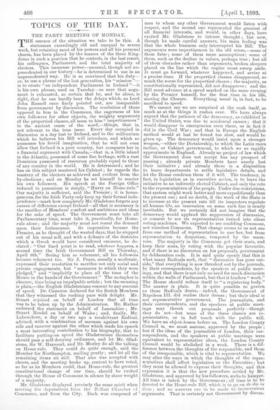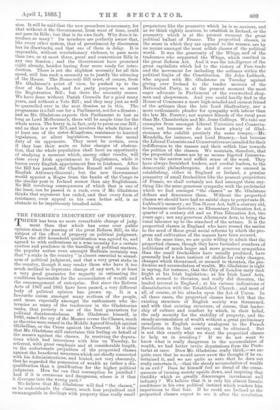TOPICS OF THE DAY.
THE PARTY MEETING OF MONDAY. THE essence of the situation we take to be this. A statesman exceedingly old and unequal to severe work, but retaining most of his powers and all his personal charm, has been placed by the masses of the three King- doms in such a position that he controls, in the last resort, his colleagues, Parliament, and the total majority of electors. This immense power—unusual, though not un- precedented in our history—he is determined to use in an unprecedented way. He is so convinced that his duty— or, to use a phrase of the last generation, his "mission "- is to create "an independent Parliament in Ireland "—it is his own phrase, used on Tuesday—so sure that argu- ment is exhausted, so certain that he, and he alone, is right, that he can hardly bear the delays which, as Lord John Russell once finely pointed out, are inseparable from government by discussion. The resolution of those opposed to him in the Commons, the eagerness of his own followers for other objects, the weighty arguments of the propertied classes, all seem to him" impertinences" in the ancient sense of the word,—things, that is, not relevant to the true issue. Every day occupied in discussion is a day lost to Ireland, and to the millennium which he believes his Bill will introduce, and which so possesses his fervid imagination, that he will not even allow that Ireland is a poor country, but compares her in a financial argument with Canada,—that is, a little island in the Atlantic, possessed of some fine herbage, with a vast Dominion possessed of resources probably equal to those of any country in the world. He is determined ; and he has on this subject mastered his Cabinet ; he regards the mastery of the electors as achieved and evident from the by-elections ; and on Monday he set himself to master his own followers. His speech at the Foreign Office reduced to pemmican is simply, "Hurry on Home-rule." Our majority is sufficient, said the Premier ; it is homo- geneous, for the Irish Party only keep up their formal inde- pendence—mark how completely Mr. Gladstone forgets any causes of difference except Ireland—all that is necessary is the sacrifice of Members' comfort and ambitions and ideas for the sake of speed. The Government must take all Parliamentary time, must take it, practically, for Home- rule alone ; and the majority must not resent the demand upon their forbearance. So imperative became the Premier, as he thought of the wasted days, that he stepped out of his usual self, and with a defiance of the destinies which a Greek would have considered ominous, he de- clared: "Our fixed point is to read, whatever happens, a second time the Irish Government Bill on Thursday, April 6th." Seeing him so vehement, all his followers became vehement too. Sir J. Pease, usually a moderate, expressed their resolution to sacrifice not only social and private engagements, but "measures to which they were pledged," and "implicitly to place all the time of the House in the hands of the Government." The metaphor is obscure, time being an impalpable article ; but the meaning is plain,—the English Gladstonians consent to any amount of speed. Dr. Cameron declared for the Scotch Members that they witnessed the rushing pace with delight. Mr. Stuart rejoiced on behalf of London that all time was to be taken up by the Administration. Mr. Blather endorsed the statement on behalf of Lancashire ; Mr. Stuart Bendel on behalf of Wales ; and, finally, Mr. Labouchere, a day or two ago a recalcitrant Radical, advised, with a combination of sarcasm against his own side and rancour against the other which made his speech a most interesting contribution to his biography, that to facilitate putting-on speed the Gladstonians themselves should pass a self-denying ordinance, and let Mr. Glad- stone, Sir W. Harcourt, and Mr. Morley do all the talking on Home-rule. They could do quite enough, said the Member for Northampton, smiling gently; and let all the remaining items sit still. That also was accepted with cheers, and the meeting broke up, content to have voted, so far as its Members could, that Home-rule, the greatest constitutional change of our time, should be rushed through the House of Commons in silence by sheer weight of a majority, Mr. Gladstone displayed precisely the same spirit when meeting the deputations from the Bc1fast Chamber lef Commerce, and from the City. Each was composed of men to whom any other Government would listen with respect, and the second one represented the greatest of all financial interests, and would, in other days, have excited Mr. Gladstone to intense thought ; but now, though he made careful answers, his main feeling was that the whole business only interrupted his Bill. The arguments were impertinences in the old sense,—some of them false ; some of them mere assumptions ; some of them, such as the decline in values, perhaps true ; but all of them obstacles rather than arguments, broken sleepers placed on the line which the engine must sweep aside. It must go forward, whatever happened, and arrive at a precise time. If the propertied classes disapproved, so much the worse for the propertied classes ; the majority, as constitutionally represented, did not disapprove ; and the Bill must advance at a speed marked on the same evening by the Premier himself, for the first time in his life, moving the Closure. Everything usual is, in fact, to be sacrificed to speed. We cannot say we are surprised at the rush itself, so much as at the things it rushes over. We have always argued that the patience of the democracy, as exhibited in the United States, was clue to accidental causes ; that it would disappear in emergencies even there, as in fact it did in the Civil War ; and that in Europe the English method would at last be found too slow, and would be given up. The democracy would insist upon a stronger weapon,—either the Dictatorship, to which the Latin races incline, or Cabinet government, to which we so rapidly approximate in England. Already no project of law which the Government does not accept has any prospect of passing ; already private Members have nearly lost their initiative ; and already there is a disposition to leave departments to settle legislative details, and let the House condemn them if it will. The tendency, in fact, in legislation as in executive action, is to leave the initiative to an indirectly elected Cabinet, and only the veto to the representatives of the people. Under due restrictions, that system might work better and more expeditiously than the present one ; and no doubt, if the work of the State is to increase at the present rate till its inspectors regulate all human life, an innovation on some such line is nearly inevitable. But we certainly did not imagine that the democracy would applaud the suppression of discussion, or consent to see its representatives turned into silent voting-machines. We expected to see confiding Commons, not voiceless Commons. That change seems to us not one from one method of representation to ano`her, but from representation to despotism, tempered by the mass- vote. The majority in the Commons get their seats, and keep their seats, by voting with the popular favourite, and if there is no discussion on his proposals, government by deliberation ends. It is said quite openly that this is what many Radicals seek, that " discussion has gone out- side," that everything is now threshed out by the journals, by their correspondents, by the speakers at public meet- ings, and that there is not only no need for much discussion within the walls of Parliament, but that it hinders" work." The House should reduce itself to "a registering body." The answer is plain. It is quite possible to govern as these Radicals desire,—indeed, the Government of Napoleon III. did realise their dream ; but their ideal is not representative government. The journalists, and their correspondents, and the speakers at public meet- ings may thresh out proposals perfectly—though they do not—but none of the three classes are re- presentative, or in full touch with the public will. We have an object-lesson before us. The London County Council is, we must assume, approved by the people ; but if the ideas of the journalists of London, their cor- respondents, and the speakers at public meetings were equivalent to representative ideas, the London County Council would be abolished in a week. There is a dif- ference between the thoughts of the responsible, and those of the irresponsible, which is vital to representation. We may alter the ways in which the thoughts of the repre- sentatives shall affect legislation or the Executive ; but they must be allowed to express their thoughts, and this expression it is that the new procedure settled by Mr. Gladstone, and approved by his followers, seeks to hamper. All time is taken by the Government ; all time is to be devoted to the Home-rule Bill, which is to go on de die in diem ; and no answers are to be made to inconvenient arguments. That is certainly not Government by discus. sion. It will be said that the new procedure is necessary, for that without it the Government, from want of time, could not pass its Bills ; but that is its own fault. Why does it in- troduce so many ? Its members are perfectly aware that, like every other system, that of government by discussion has its drawbacks, and that one of them is delay. It is impossible, without revolutionary violence, to pass more than two, or at most three, great and contentious Bills in any one Session ; and the Government have promised eight already, besides having four more ready for intro- duction. There is not the slightest necessity for all this speed, still less such a necessity as to justify the silencing of the House. The Home-rule Bill must, of course, from Mr. Gladstone's point of view, be pushed up to the door of the Lords, and for party purposes so must the Registration Bill; but there the necessity ceases. We have done without Parish Councils for a good many years, and without a Veto Bill ; and they may just as well be quarrelled over in the next Session as in this. The programme is a full one for a Parliament, not for a Session ; and as Mr. Gladstone expects this Parliament to last as long as Lord Melbourne's, there will be ample time for the whole series. The hurry is, in fact, only to press on one Bill ; and as that is a new Bill, and involves the whole future of at least one of the sister-Kingdoms, resistance to hurried legislation, or silent legislation, becomes the moral duty of its opponents. They must be certain, even if they lose their seats on false charges of obstruc- tion, that the whole population shall have an opportunity of studying a measure which, among other results, will close every Irish appointment to Englishmen, while it leaves every English appointment free to Irishmen. After the Bill has passed, Sir Charles Russell will remain the English Attorney-General ; but the new Government would appoint a Negro from the banks of the Congo to the similar post in Ireland sooner than any Englishman. No Bill involving consequences of which that is one of the least, can be passed in a rush, even if Mr. Gladstone thinks that argument has ended, and that every form of resistance, even appeal to his own better self, is an obstacle to be impetuously brushed aside.



































 Previous page
Previous page